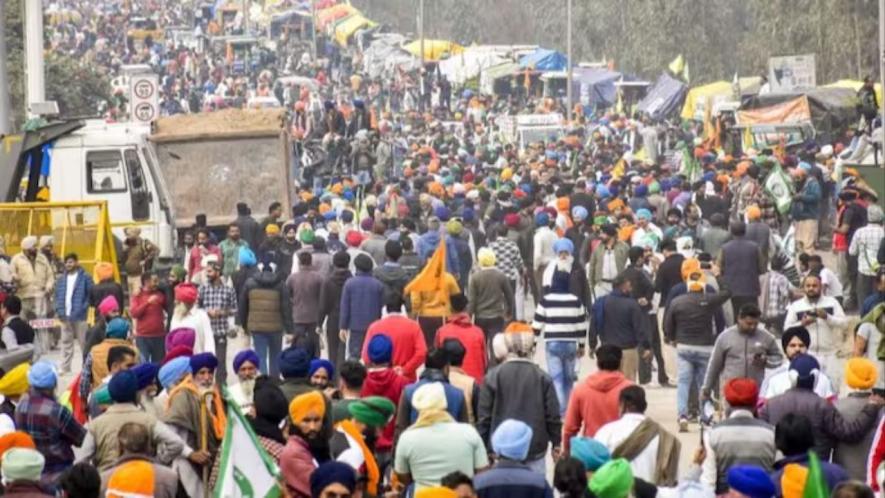On the Peasant Demand for a Guaranteed Minimum Support Price

Farmers gather at Punjab-Haryana Shambhu border for their 'Delhi Chalo' march. Image Courtesy: PTI
India has been facing an agrarian crisis that spans across the dimensions of viability, employment, ecology, and inequality. A fundamental determinant of this agrarian crisis has been the attenuation of government support to agriculture which has had a deleterious impact on agrarian India but has disproportionately impacted rural workers and (especially but not exclusively poor and middle) peasants. This attenuation has been driven by the neoliberal project with the aim of furthering corporate encroachment into peasant agriculture. Corporate encroachment into peasant agriculture is a process which, if allowed to continue, will involve agrarian India being hegemonised by corporate agribusiness (that has coalesced with international finance capital).
The Union government of India had sought to impose the three farm laws in 2020 to further this very process of corporate encroachment in peasant agriculture. However, peasants and workers jointly launched a struggle, that was historically unprecedented in terms of tenacity and political dexterity against the three farm laws that resulted in the Union government of India being compelled to repeal these three farm laws.
Though the Union government of India agreed to set up a committee to examine the demand of peasants for a guaranteed Minimum Support Price (MSP) for marketed agricultural produce, nothing worthwhile transpired on this front. The Samyukt Kisan Morcha (SKM) and the Kisan Mazdoor Morcha (KMM) have launched a fresh agitation to get the Union government of India to concede their demand for a guaranteed MSP.
The MSP is a price at which the government will ostensibly commit to purchase any magnitude of marketed agricultural produce from peasants and other farmers. Of the publicly procured agricultural produce, a part is sold at subsidised prices through the public distribution system to targeted beneficiaries (that exclude a fraction of the poor). In 2004, the Union government of India, set up a committee which was chaired by the late M S Swaminathan to examine the concerns of Indian farmers. However, most of its recommendations, which were presented in 2006, have not been implemented by the Union government of India.
The MSP in India is firstly a declaration that covers 23 crops. Usually, the MSP is meant to be determined for each type of agricultural produce after accounting for its cost of cultivation. But the declared MSP tends to be set on the basis of the accounting cost. This magnitude of accounting cost often tends to incorporate a rough estimated cost of family labour expended. However, this magnitude of accounting cost excludes the magnitude of imputed ground rent and imputed interest on capital which underlies the cost of agricultural production. Peasants and workers are arguing that MSP for various produce ought to incorporate the economic cost of cultivation. The economic cost of calculation would equal the accounting cost of cultivation plus the sum of imputed interest and imputed rent. Besides, there are inordinate lags between the increases in the cost of production in agriculture (due to neoliberal policies and practices) and revision of MSP.
MSP will be effective only if there is actual public procurement. Procurement of agricultural produce is meant to take place at the Agricultural Produce Marketing Committee (APMC). However, the regional spread of APMC mandis is uneven. In those areas where APMC mandis are very distant, peasants are compelled to sell their agricultural produce at prices below MSP. The following example will illustrate this case: Let the MSP be 10 per unit while the private procurement price is 6 per unit. If the transport cost per unit from the farm to the APMC mandi is five then peasants will be constrained to sell their agricultural produce to private procurers since their effective price on account of private procurement is six while it would be five (=10-5) in the case of public procurement.
Public procurement may be undertaken either by the Union government or state governments. Given the skew of financial powers that favour the Union government (which is rising under the neo-fascist dispensation), the ability of state governments to engage in public procurement is limited at best.
When peasants and workers demand a guaranteed MSP, denizens of the neoliberal project principally argue against it by claiming that it will (ostensibly) be fiscally burdensome. This argument is not tenable. Let us see how.
Let us assume that the cost to the government of guaranteeing MSP (including the expansion of PDS) is 100. Now this amount may be raised either by borrowing or by taxation. A simple means to borrow these funds is firstly through an increase in the statutory liquidity ratio. This will have no adverse macroeconomic impact (since bank loans create bank deposits at the macroeconomic level). Secondly, the resources required maybe raised through taxation. The most expedient means of taxation is an increase in corporate and wealth taxes. If the savings of the working people are near zero (as is the case in India), then a matching increase in government taxes and government expenditure will leave the macroeconomic magnitude of profits unchanged. If this increased expenditure is financed by borrowing then it will actually increase the macroeconomic magnitude of profits.
The two propositions that were set out in the previous paragraph were based on the assumption that the trade deficit of the economic was zero throughout. However, even if we allow for a trade deficit, the proposed policy of guaranteeing MSP will not increase the trade deficit appreciably since the import intensity of the expenditure of the working people is likely to be lower than that of capitalists. Further, if investment increases due to a rise in the degree of capacity utilisation (that an increase in output due to government expenditure on guaranteeing MSP will entail) then the macroeconomic magnitude of profits will rise.
The following empirical exercise seeks to estimate both the cost of guaranteeing MSP and how to raise resources to finance it.
Let us for the sake of argument not dispute the purported estimate of funds required for guaranteeing MSP in India which is Rs. 10 lakh crores. If MSP is guaranteed, it does not follow that the government has to publicly procure the entire magnitude of agricultural produce. It would be adequate if the government publicly procured only a fraction of agricultural produce, say 50%, while the rest may be privately procured at MSP. How can the latter be ensured? The government must publicly pronounce that any sale from public stocks of agricultural produce will be at a mark up over MSP. How would this help? Let MSP be 10 and let the price at which the government would sell to the private market be 13. Then no private procurer would fail to pay MSP to procure from the peasant. This system would work only if foreign trade in agricultural produce is regulated on non-neoliberal lines. If world price net of transport cost (say 12) is higher than MSP (say 10) then the government must announce a bonus of 2 on MSP so that no peasant or other farmer is impelled to export their agricultural produce (directly or through adverse changes in crop composition away from food crops) to an extent that compromises domestic food security. Likewise, the adverse impact of import of agricultural produce at prices below MSP can be countered by an import tariff, import controls and by appropriately increasing the magnitude of public procurement.
For public funding of MSP guarantee of Rs. 5.2 lakh crores, approximately Rs. 2.5 lakh crore has already been spent by the current Union government. The residual amount of Rs. 2.7 lakh crores can be generated through three sources of public finance. Let us examine each of them briefly.
First, rationalisation of corporate tax rates by restoring the share of corporate tax in total tax revenue to its level in 2014. According to the interim Budget presented by the Union Finance Minister, on 1st February, 2024, the shares of corporate tax and income-tax in Gross Tax revenue are expected to be at 27% and 29% respectively during 2024-25 (Budget, 2024-25 Document). A decade back, as per the interim budget document in 2014-15, these respective shares were 33 % and 22%. This implies that during the Modi government’s 10-year tenure (2014-15 to 2024-25), there was an adverse change in the composition of direct taxes in favour of big business by reducing the share of the corporate tax in gross tax-revenue by 6% from 33% to 27% while increasing the share of income-tax by 7% point from 22% to 29%. We propose that corporate tax rates and collection be rationalised so that the share of corporate tax revenue in total revenue rises from its current level of 27% to the 2014-15 level of 33%.
Second, deploy a (progressive) wealth tax on those whose wealth exceeds Rs. 10 crores.
Third, increase the statutory liquidity ratio of commercial banks for raising a part of the funds required to guarantee MSP.
Let these three sources of public finance generate funds of Rs. X. If the government spends an additional Rs. X to guarantee MSP then peasants are likely to spend most of it. This will increase output and tax revenue (as previously argued). If we assume that the total tax revenue (as direct and indirect taxes) generated (in this manner) is a fifth of government expenditure then Rs. 0.2*X would return to the government. In other words, the net additional expenditure of the government to guarantee MSP would be Rs. 0.8*X. We provide an approximate numerical estimate of the various sources involved in the next paragraph.
Figure 1 shows an approximate break-up of the composition of additional resources that need to be raised as a proportion of gross tax-revenue in 2024-2025 (projected at Rs. 38.31 lakh crore or as an exact amount of Rs. 38,30,796.40 crores, as per the Budget 2024-25) for guaranteeing MSP namely Rs. 2.7 lakh crore,
Figure is constructed by the authors using Budget Data 2024-25
The figure shows both volume and shares of Rs. 2.7 lakh crores (7% of gross tax-revenue) from the four sources set out above, viz., (i) Rs. 1.15 lakh crores (3%) from corporate tax, (ii) Rs. 0.77 lakh crores (2%) from wealth-tax to be imposed on those wealth exceeding Rs. 10 crore, (iii) Rs. 0.38 lakh crores (1%) from a rational statutory liquidity ratio (SLR) of the commercial banks and (iv) Rs. 0.38 lakh crores (1%) from an expansion in tax-base of direct and indirect taxes by an increase in peasants’ income due to the three other sources of Union government expenditure for guaranteeing MSP (corporate and wealth taxes as well as rational SLR).
This implies that public procurement of 50% of the agricultural produce at MSP will require Rs. 5.2 lakh crores for guaranteeing MSP. Having demonstrated that “lack of resources” argument is not tenable to stymie the MSP guarantee, let us now briefly examine the underlying political economy.
The record of the Union government in undertaking public procurement has been determined by its being a key element in the neoliberal project in India. First, as previously argued the sites of APMC mandis are strategically dispersed to reduce public procurement. Second, (and also as previously argued), current MSP does not reflect current (leave alone economic) cost of agricultural production. Third, there are often long delays between the time of public procurement and payment to peasants. All three factors increase agrarian distress. A guaranteed MSP would require all three factors to be overcome along the following lines.
Firstly, the regional and crop skew of public procurement must be corrected so that no peasant is compelled to sell their agricultural produce below MSP. This must be achieved not by reducing public procurement in any state but solely by increasing public procurement in those states where it is deficient to guarantee MSP.
Secondly, a rise in MSP may lead to a rise in the private market price of agricultural produce. This may be countered by expanding the public distribution system (PDS) in two ways. First, by moving from a targeted PDS to a universal PDS. This will prevent the working people from being adversely affected by any price rise. Second, expanding the number of items that are issued through the PDS. While the revenue to the government from selling through the PDS may not be very significant, it will necessarily reduce the storage cost of publicly procured agricultural produce that has been stocked.
At present, MSP is merely a policy decision and there is no law of parliament that would guarantee its implementation throughout the country. Given the recent track record of MSP implementation evolving into an instrument to further corporate encroachment into peasant agriculture, both peasants and workers are rightly apprehensive about a further aggravation of agrarian distress. Therefore, they are reiterating their demand for a guaranteed MSP for agricultural produce along with related demands for debt waiver, universal pension etc. Through their struggle, they are resisting not only the neoliberal project in India but also combating neo-fascism that is hegemonising this project.
Narender Thakur is associate professor, Department of Economics, BR Ambedkar College, University of Delhi. C. Saratchand is professor, Department of Economics, Satyawati College, University of Delhi. The views are personal.
Get the latest reports & analysis with people's perspective on Protests, movements & deep analytical videos, discussions of the current affairs in your Telegram app. Subscribe to NewsClick's Telegram channel & get Real-Time updates on stories, as they get published on our website.
























